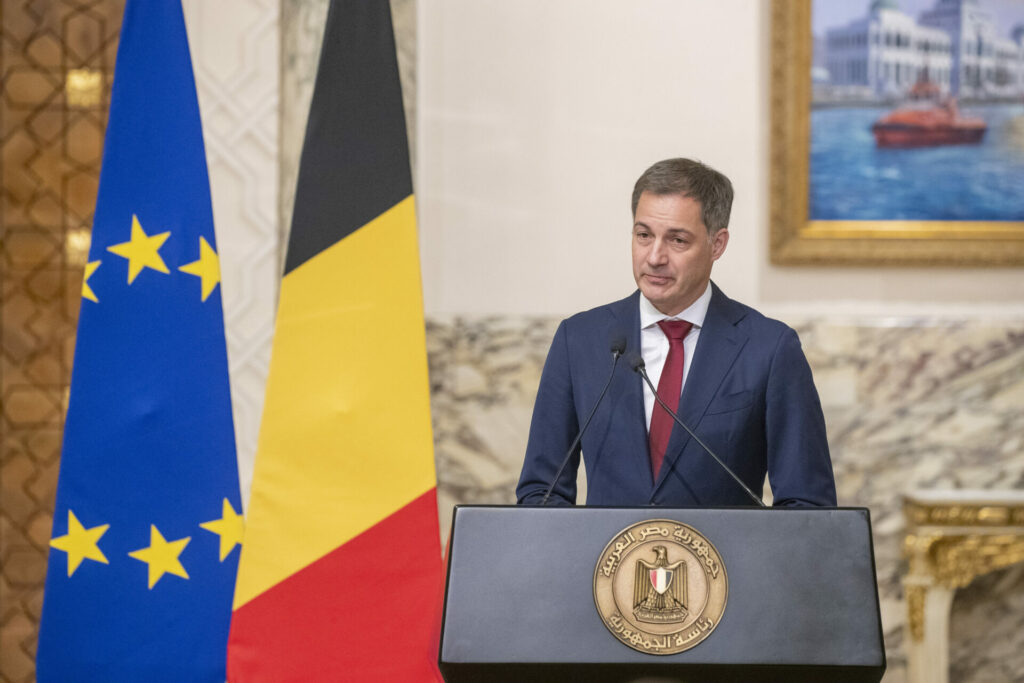Belgian Prime Minister Alexander De Croo indicated on Wednesday that he wants to ban violent extremist settlers in the West Bank from entering Belgium.
In a speech at the International Conference on 75 Years of the Universal Declaration of Human Rights at Ghent University, De Croo underlined his commitment to protecting civilians from violence in the Middle East.
"Extremist settlers in the West Bank will be banned from entering Belgium. We will work with the US on sanctions targeting individuals involved in actions that undermine peace, security, and stability in the West Bank," he said.
The remarks come just after the US Secretary of State Antony Blinken yesterday announced new visa restrictions targeting individuals involved in violence against civilians in the occupied West Bank.
"We will work with the United States on these sanction measures and will push the EU to follow suit," De Croo continued, before adding that "violence against civilians will have consequences."
Since Hamas terrorist attack on 7 October, violence has escalated in the West Bank, with at least 258 Palestinians killed, according to the Palestinian Authority's statistics. While most of them have been killed during clashes between Israeli forces and Palestinians belonging to Hamas and other terrorist groups, civilians have also been victims of unprovoked violence by settlers.
On Thursday, the European Commissioner for Crisis Management Janez Lenarčič called the demolition of an EU-funded school in the West Bank "intolerable". In the images, the Belgian development agency's logo is visible.
Related News
- Belgian PM De Croo 'very sorry' to see Israel-Hamas war resume
- Israeli Ambassador to Belgium sparks row over Marc Dutroux comparison
- 'I stick to that point': De Croo defiant as Israel summons Belgian and Spanish ambassadors
The situation in the West Banks deteriorated after the Israeli national security minister started to hand out weapons to settlers in the West Banks for self-defense after the 7 October attack. Israeli authorities claim that extremist settlers only constitute a small group of around 100 people, and state that they recently have announced new measures to stop settler violence.
The military and police have been criticized for not reining in violent settlers and arresting them for attacking Palestinian villages. “The situation in the West Bank is relatively calm thanks to the Palestinian Authority,” Peter Stano, EU’s lead spokesperson for foreign affairs, commented at the Commission’s press conference on Thursday. “Unfortunately, we see incidents like this and they must stop”.
The terrorist attack in Jerusalem last Thursday might serve as a wake-up call. An armed Israeli civilian who interfered and shot the two terrorists in the attack was himself killed by a reserve soldier at the scene from one of the illegal outposts in the West Bank after he had dropped his gun and raised his hands.
The spokesperson referred to a statement of G7 yesterday. The leaders of G7, of which the EU is a member, met virtually to address global challenges and shape a course for a better future.
In their statement on the situation in the Middle East, they condemned “the rise in extremist settler violence committed against Palestinians, which undermines security and stability in the West Bank, and threatens prospects for a lasting peace. Those who have committed crimes must be held to account.”
The EU Foreign Affairs Council, chaired by High Representative Josep Borrell, will meet on Monday next week to discuss “the Russian aggression against Ukraine and the situation in Israel, the Gaza strip and the region”.
Peter Stano, the spokesperson, said that the foreign ministers from the EU member states will discuss in detail the evolving situation in Israel-Hamas war and the possibility of extending the humanitarian pauses to a longer cease-fire, as the Belgian Prime Minister has called for. He did not say if they also will discuss sanctions against extremist settlers.
“What is important for the EU is to reach a consensus. In foreign affairs, it’s done by unanimity, which means that all 27 member states have to agree,” he stressed.

